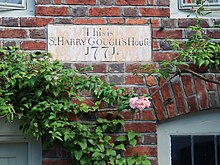|
Henry Gough-Calthorpe, 1st Baron Calthorpe
 Henry Gough-Calthorpe, 1st Baron Calthorpe (1 January 1749 – 16 March 1798), known until 1796 as Sir Henry Gough, 2nd Baronet, was a British politician who sat in the House of Commons from 1774 to 1796 when he was raised to the peerage.[1] Early lifeGough was the son of Barbara Calthorpe, the only daughter of Reynolds Calthorpe of Hampshire and first wife of Sir Henry Gough, 1st Baronet.[2] He was educated at Eton College from 1762 to 1767, followed by Oriel College, Oxford in 1767 and the University of Edinburgh from 1768 to 1769.[1] On 8 June 1774 he succeeded to his father's title and estates.[2] Political careerIn the 1774 general election, Gough was returned as the Member of Parliament for Bramber, a rotten borough controlled by his family.[1] He was returned again in 1780 and 1784. He took the additional surname of Calthorpe by royal licence in 1788 on succeeding to the estates of his maternal uncle, Sir Henry Calthorpe. Previously an independent member, from 1788 he was a supporter of William Pitt the Younger.[1] He was returned again for Bramber in 1790. In 1791 he opposed the repeal of the Test Act in Scotland and in March 1796 he voted against abolition of the slave trade.[1] On 16 June 1796, he was created Baron Calthorpe, of Calthorpe in the County of Norfolk, in the Peerage of Great Britain, and gave up his seat in the House of Commons.[2] He had first applied for a peerage in 1789.[1] FamilyOn 1 May 1783, Gough-Calthorpe married Frances Carpenter, the second daughter and co-heiress of General Benjamin Carpenter.[2] They had eight children:
The first baron was succeeded in the baronetcy, his eldest son having predeceased him, by his next three sons in turn. The widowed Lady Calthorpe took up residence in Grosvenor Square.[3] She died on 1 May 1827, while visiting Brighton. ArmsReferences
|

